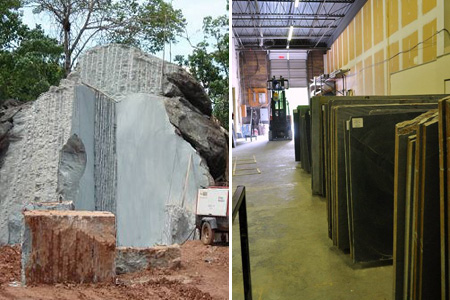What is soapstone?
Soapstone is a natural stone quarried all over the world. It is a metamorphic rock (rocks that have “morphed” into another kind of rock) that is formed over millions of years by heat and pressure deep inside the earth.
Soapstone is also known as as “steatite”, which is comprised primarily of the minerals talc, chlorite, dolomite, and magnesite. There are different colors, types and qualities of soapstone. Artistic grade soapstone contains a higher talc content, which means that it is softer and suitable for carving. Philadelphia Soapstone Company soapstone is HIGH QUALITY architectural grade soapstone imported from Brazil, one of the few places this rare and unique stone is still commercially quarried.
Common uses for soapstone include counter tops, drain boards, kitchen sinks, stair treads, basins, cookware, floor tiles and heaters. Soapstone is unaffected by heat, making it an excellent choice for active kitchen spaces and fireplace liners. Innovative craftsmen are constantly developing new and creative uses for this workable stone.
What maintenance is required?
Little to none. An optional periodic treatment with mineral oil (simply wiping the surface with a lightly oiled cloth) accelerates the natural darkening process. Regular cleaning is easy with any common household cleaner. Soapstone will not show finger prints. Soapstone surfaces need not be sealed, but we recommend treatment with mineral oil if consistent surface darkening is desired. Without treatment, soapstone will darken in uneven regions around surface areas most frequently used. Leaving the soapstone untreated will develop a patina of age that many people enjoy. If you change your mind, you can always oil the stone anytime.
As soapstone is nonporous, the oil does not actually penetrate the stone surface, but a light wiping accelerates the natural darkening process evenly. It may take several courses of mineral oil (over time) to obtain a soapstone’s darkest natural state. There is no benefit (or harm) in leaving extra oil on surface, it will not be absorbed. Excess oil may be simply wiped off.
What happens if you do not oil the soapstone?
In time, the soapstone will darken around the surface areas most frequently used, particularly in a kitchen or food service environment. Leaving the soapstone untreated will develop a patina of age that many people enjoy. If you change your mind, you can always oil the stone anytime.
Do you need to seal soapstone?
We do not recommend sealing soapstone. Sealers are intended to seal porous stone like marble and granite which can stain. Soapstone is a very dense, nonporous stone which does not need to be sealed.
How do you clean soapstone?
We recommend using a mild dish detergent and water. If stronger cleaning agents are used, the surface mineral oil treatment may be affected and need reapplied for consistency. Even if powerful industrial cleaners are used, soapstone is chemically inert and will not be harmed.
Can you scratch soapstone?
Yes you can. The great advantage of soapstone is rubbing some mineral oil on the scratched area can hide most light scratches. Deeper scratches are easily removed with a light sanding and an application of mineral oil.
How does soapstone withstand heat and temperature changes?
Soapstone is essentially inert. Neither hot nor cold temperatures will harm the stone. Soapstone does not expand or contract with temperature fluctuations and it will not crack due to these sudden changes. Architectural grade soapstone is practically indestructible. Denser than granite, slate and marble, soapstone is completely nonporous making it impenetrable to liquids and stain proof. Soapstone is inert making it impervious to reactants and chemicals. Soapstone has long been a favorite material for laboratory work benches and chemistry room floors. Soapstone is unaffected by very high temperatures, making it an excellent choice for active kitchen spaces and fireplace liners. Hot cookware from the oven or stove may be placed directly on your soapstone counter top surface without worry about the stone being damaged by heat.
Soapstone is also used for pizza stones, cooking pots, and many other related applications. You can take a scolding hot pot right from your stove, and place it on your soapstone counter tops and not harm the soapstone. Soapstone is used as the main component in masonry heaters. Due to its excellent thermal qualities soapstone makes an excellent heater. Soapstone is also used in the building of fireplaces and ovens.
Our soapstone partners have a history of creating fireplaces with great success for more than a decade. Soapstone works exceptionally well as a material for stove building. When using a soapstone heater, the air remains clean, the floor and the walls are comfortably warm and the humidity in the air remains stable.


Leave a Reply
Want to join the discussion?Feel free to contribute!